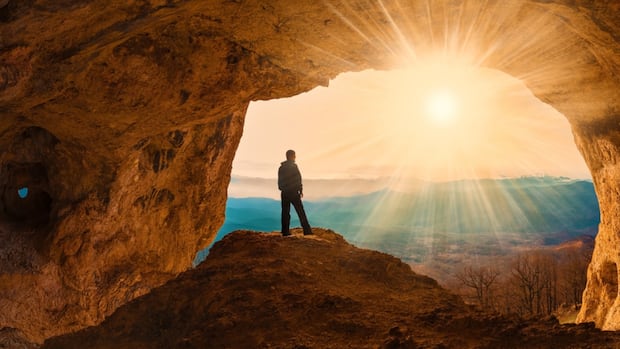
Step in unknown is good for us – and being an explorer does not require skidiving
the current24:53Are you a explorer? Alex Hachinson says that we are all
For many people, the word “exploration” takes into account the adorable tricks: climbing huge peaks, sinking in the depth of the sea or climbing through the wind on a skidaive. But Alex Hachinson challenges people to redefine explorations – suggesting that it is not only for adrenaline crazy.
“There is a middle definition where it is not just about physical exploration – it’s not just about the extreme or anything like this,” Hachinson said the currentMatt Gallowas.
Instead, he says that exploration is any moment where we step into unknown, take a risk, or look for development.

“There should be some bets – you are entering the unknown, you are taking a way where you don’t know how it is going to exit – maybe going to struggle on the way.”
Hachinson is the author of Explorer gene: Why do we want big challenges, new tastes and empty spots on mapsWhich searches for our innate drive to search for unknown.
We are all to detect
Hachinson says that exploration can take different looks for each of us, but it is something for which we are built for – our biology says Hardwire, Hachinson.
Our brain’s happiness system, the former physicist said, not only to reward success, but when something surprises us in a positive way, then to light. That bounce of dopamine pushes us to look for new and unexpected experiences.
Hachinson points to a simple example: how children are naturally motivated to change things while playing in the playground. First, they are excited to go under the slide, but after a few turns, kicks in curiosity – they start climbing up instead, inventing new and creative methods to play.
“They know that uncertainty has gone, so they are preferring,” Okay, now we are going to go on the slide. ”
Brent Hogrth, a licensed clinical psychological with specialization in sports and high-demonstrations in BC agree. He says that the urge to find out is fundamental as any basic human need.
“There is a need like vitamin C, there is a need for exploration and adventure,” he said.
It is powered by what a neuroscientist looking system is called – a fundamental drive in the brain that keeps us curious, ambitious and open for possibility.

“Whenever the feeling system becomes active – whether you are on an adventure work, you are learning, you are experimenting at work – we get a big hit of dopamine that is not about reward, but more, more, more, about the motivation to get more information, more, use more, more, use more, more,”.
Balance
Nevertheless, knowing when to stretch yourself – and when to step back – is as important as finding the work of finding yourself, Hachinson.
There is also value in living within our comfort zone – to find out when to find out, and we have to “exploit” the already existing knowledge and experience.
Identity to switch between the two is important to avoid burnouts and maximize development.
“As you are doing better what you are doing, you have to increase the challenge … (which) leads to development because you have to stay on the shore, keep walking for it,” Hogarth said.
That edge should not be dramatic. In fact, Hagarth recommended that he says “front loading”-a small, low courage that prepares us for big moments.
Hagartha says that praising a stranger or chatting with a person who makes your coffee. These slight moments create the necessary confidence and mental habits to deal with more intimidating goals, such as speaking in a meeting or taking a new role.
“When presenting the moment of uncertainty or adventure ourselves, we have worked so that we can go for it,” he said.
Veronica Park, a registered clinical consultant of BC, believes in embracing the limitations of our abilities without shame.
“We (all) cannot be Einstein,” he said, but said that no one makes anyone less valuable, because everyone has its own unique talent and strength.
“It is better to live within that limit, rather than that I am pushing it and feeling that I am tired of myself.”

This is the moment, the park says, when you can accept, “maybe it is the limit of my ability and gifts, and I learn to take it with humility, saying, ‘I am satisfied with what I am.”
Ultimately, Hachinson says, exploration is not about perfection – because by nature, it is uncertain.
He says that what matters the most is not a guarantee of success, but choosing the way with the greatest capacity.
He said, “What you want to do is such an option that when you are looking back, even if it is wrong, you will not regret it,” he said.
“So, you take a chance, you see what is the greatest possible, what is the best realistic result, and you say,” Let’s try, and even if it doesn’t work, at least I will not try to try. ”